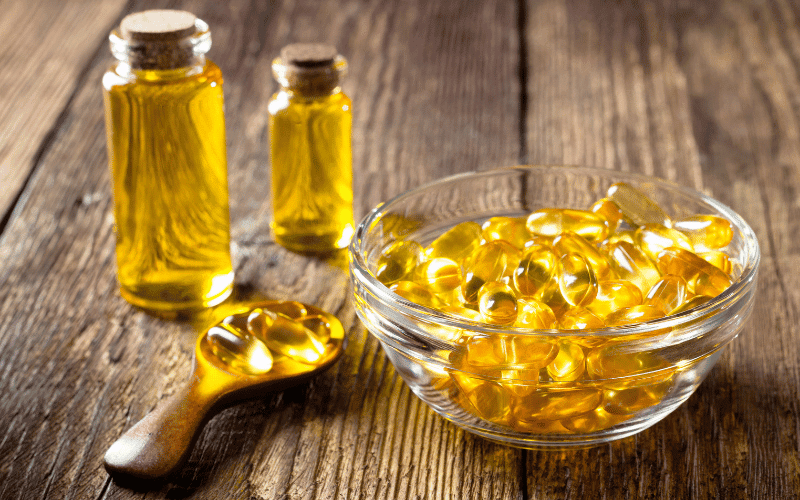Intermittent Fasting’s Sidekick: Why Fish Oil Might Just Be Your Health Ace
Embark on a cerebral journey where we dissect the age-old conundrum: To pop or not to pop that fish oil pill while fasting? Buckle up, brainiacs and biohackers, for a no-fluff, all-stuff guide to keeping your fast pure without missing out on those slick, health-boosting omegas. Learn the “why’s” and “why not’s” of fish oil during fasting, unpack the equation that could riddle Plato, and decrypt the science behind those mesmerizingly minute calories. Pierce the veil of fasting purism and discover how you might just optimize your body’s synergistic dance between calories and ketones, all while maintaining a fasting-fed balance that even holistic health warriors nod to in respect.
EPA and DHA, the dynamic duo of Omega-3s found in fish oil supplements like those from Nordic Naturals or Nature Made, wade through the waters of dietary restrictions, often reaching the fasting aficionado’s shore. The fasting equation (0 calories + 0 carbs + 0 protein = fasting state) isn’t notably disrupted by these lipid-laden capsules, especially when one considers the standard fish oil pill contains less than 10 calories.

Dr. Sarah Fisher, a board-certified nutritionist, articulates, “Fish oil supplements, when taken during a fast, aim to deliver essential fatty acids without dismantling the fast’s integrity.” Essential, in this context, is bolded for its weight, as Omega-3s are crucial cogs in the machinery of cell membranes.
The fasted state is a biological stint of metabolic arithmetic; food intake drops to zero, but the body’s need for nutrients remains a constant ‘x’. Here, ‘x’ can be partially satisfied by the math of fish oil capsules, which provide power-packed EPA + DHA, while not significantly raising blood sugar levels or insulin, ensuring the fast’s goal remains uncompromised.
In the world of Intermittent Fasting (IF), spanning regimes from 16:8 to OMAD (One Meal a Day), the fasters wrestle with the quandary, “To supplement or not to supplement?” Considering IF allows for a calorie intake period, the addition of fish oil during the fasting window (calorie intake = 0) becomes less about the physical calories and more about sustaining long-term health benefits.
With the fasting spotlight often on autophagy (cellular ‘self-eating’), the process where 2 damaged proteins kiss goodbye, resulting in 1 rejuvenated protein, the presence of Omega-3 fatty acids sourced from fish oil might just be the silent cheerleader, subtly encouraging this intricate biological dance.
Nutrition forums and fasting apps, with communities akin to MyFitnessPal and Zero, bubble with discussions on the benefits of fish oil, where anecdotal experiences converge to suggest that a couple of fish oil pills won’t fish out the benefits of a fast. Instead, they may add a line of defense with 1 pill’s potential anti-inflammatory properties.
Keeping it light and straightforward, consider this: a teaspoon of olive oil clocks in at around 40 calories, while a standard fish oil supplement lurks at the lowest calorie threshold, typically under 5 calories per capsule. This minute addition is akin to adding a negligible drop of oil to a vast, unfrozen Arctic Ocean.
As fasting gurus like Dr. Jason Fung suggest, the emphasis should be on the metabolic benefits of fasting, rather than the rigorous tracking of a calorie deficit. It’s not about subtracting to 0 but optimizing the function where fasting time > eating time.
The ketogenic community – those valiant voyagers through seas of fat – often adopt fasting as an ally. They regard the fish oil capsule, bobbing with around 1 gram of fat, as a nugget of nutritional gold, that doesn’t breach the carbohydrate bank or tip the ketosis scale.
For the biohacking sect, always on the lookout for optimizing human performance, the equation is non-negotiable: max benefits with min intervention. Fish oil fits this formula, offering a compound interest of health returns, incrementally building a robust foundation without breaking the metabolic fast.
On the scientific front, the consensus wards off hyperbole with a lab coat’s precision; the lipid profile of fish oil does not provoke insulin production significantly, thus preserving the fasted state where insulin levels = basal levels.
For those math-minded folks seeking the golden ratio of fasting efficacy, consider this sum: fasting hours (16) + fish oil (2 capsules) ≤ non-fasting hours. The inequality holds, suggesting fish oil’s minimal caloric input doesn’t tip the metabolic scales.
Debates in fasting forums often digress into the nitty-gritty of whether a fish oil capsule would break a fast more than a cup of black coffee – a beverage widely accepted in the fasting community – enters the fray. With both under 5 calories depending on the brand (think Bulletproof or Starbucks), the decision rests on subtle preferences rather than disruptive scientific evidence.
Holistic health advocates, perennially seeking balance, emphasize that fasting should not equate to nutritional deprivation. Hence, the introduction of high-grade fish oil, replete with EPA and DHA, into the fasting matrix is seen not just as acceptable, but indeed advisable for maintaining a well-rounded health regime.
Concluding with a nod to the empirical, while the letter of the fasting law might frown upon any caloric intake, the spirit of fasting – aimed at health and longevity – can embrace the humble fish oil capsule, which smuggles in countless benefits under the guise of less than a teaspoon’s worth of calories – a veritable David among dietary Goliaths.
